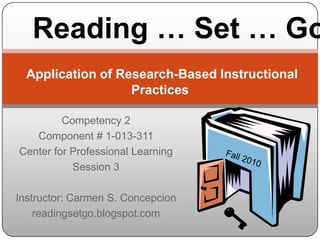
Session 3
- 1. Reading … Set … Go! Application of Research-Based Instructional Practices Competency 2 Component # 1-013-311 Center for Professional Learning Session 3 Instructor: Carmen S. Concepcion readingsetgo.blogspot.com Fall 2010
- 2. The Pig Personality Profile
- 4. FLaRE Professional Paper Phonemic Awareness “The lack of phonemic awareness is the most powerful predictor of difficulty in learning to read.” -Bill Honig, Linda Diamond, and Linda Gutlohn, 2000 Teaching Reading Sourcebook for Kindergarten through Eighth Grade, p. 2.16
- 5. What We Know From Research Phonemic awareness instruction: Involves students’ understanding of how words in spoken language are represented in print. Helps all young students to learn to read. Is most effective when students learn to read. Is most effective when students learn to use letters to represent phonemes. Also helps preschoolers, kindergarteners, and first graders learn to spell.
- 7. Phonological Awareness Cards Match the activity cards to one of the phonological awareness on the continuum Write the type of phonological awareness on a sticky note and attach it to the card Some types will have more than one activity
- 8. Reflection Would any of these activities be useful with your current students? Why or why not? What adaptations might you make at the secondary level?
- 9. Phonemic Awareness and Phonics Phonemic awareness instruction: Focuses students’ attention on the sounds of spoken words Helps students make the connection between letters and sounds During reading and spelling activities, students begin to combine their knowledge of phonemic awareness and phonics
- 10. Phonemic Awareness + Print When students are ready, many phonemic awareness activities can be expanded to help students make the connection between letters and sounds. Phonemic Awareness is the platform for the instruction
- 11. Share Investigative Activity Phonemic Awareness
- 13. Learn Network Set up passwords http://www.justreadflorida.com/learn/ Watch the following videos Phonics Instruction at the Elementary Level Phonics Instruction for Struggling Adolescent Readers Website Reflection How does this website enhance student learning? How can this website be utilized best in the classroom?
- 14. Remember… Phonemic awareness “…provides children with essential foundational knowledge in the alphabetic system. It is one necessary instructional component within a complete and integrated reading program.” -National Reading Panel, 2000 Teaching children to read: An evidence-based assessment of the scientific research literature on reading and its implications for reading instruction, p. 8
- 15. Investigative Activity Read: A Closer Look at the Five Essential Components of Effective Reading Instruction A Review of Scientifically Based Reading Research for Teachers pages 5-12 Use guiding questions on next slide to reflect Post your reflection on the class blog Be ready to share next session
- 16. Guiding Questions What does phonological awareness look like in your classroom? Are activities sequenced, and aligned to a developmental continuum? Does everyone (students, teachers, and parents) understand the continuum? Is phonemic awareness a part of your daily language arts lesson? Does each activity have a clear focus on a linguistic unit that is appropriate by level (phoneme, on-set, syllable, word)? Is the difference clear between oral language manipulation and written symbol manipulation? Are students allowed to practice enough? How will you measure progress? *If you do not teach Reading, please interview one of the reading teachers at your school
Notes de l'éditeur
- Teachers in heaven
- Current researchers state that a student’s phonemic awareness skill level is a more powerful predictor of reading ability than IQ.
- Children’s phonological awareness includes a continuum of skills that develop over time.From simples to the most complex: rhyme and alliteration sentence segmentation syllable blending and segmentation onset-rime blending and segmentation phoneme blending, segmentation, and manipulationAlso, within each phonological skill level, degrees of comlexity exist.
- As soon as print is added to a phonological awareness activity, it becomes a phonics activity.
- Phonemic Awareness Activity CardsFind the card: “Blending Sounds”The top card is a phonemic awareness activity.The activity card below has been expanded to include letter-sound knowledge.Students blend and match sounds with letters together to read words.Let’s look at how this activity has linked phonemic awareness to print.Read and discuss the +Print Blending Activity Sounds activity card.How has this activity been expanded to include print? Letters were substituted for the blank countersNow, it’s your turn.Have participants pair up. Assign one of the Phonemic Awareness Activity Cards to each pair.Link your activity cards to letters and print.
